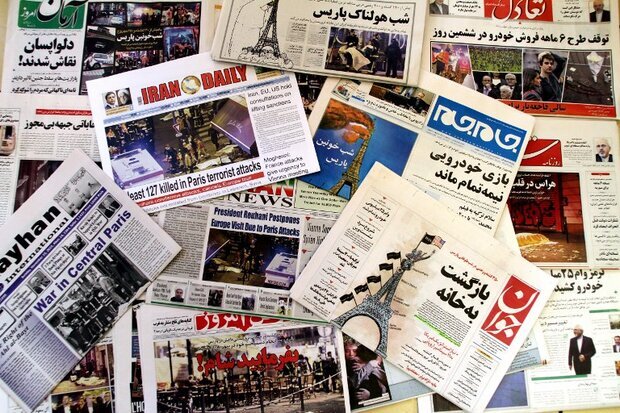Iran-Saudi deal has 5 messages for enemies and friends

Resalat writes the agreement between Iran and Saudi Arabia to resume relations has 5 special messages for friends and enemies of the Islamic Republic:
1. The defeat of the Zionist regime's conspiracies in disrupting Iran's relations with the Arabs
2. The failure of the "Isolation of Iran"
3. Regional policies can be regulated by the main players without the intervention of the West.
4. The fading role of the U.S. in West Asia
5. Regional authority and military developments can be handled by diplomacy
In a meeting with students in early November, the Leader of the Revolution said: "The current order of the world is changing, and there are three basic lines in this change."
First line: America's isolation
The second line: the transfer of political, economic, cultural, and even scientific power from the West to Asia.
The third line: The resistance front, led by Iran, is expanding against American bullying.
Soon we will hear the news that these three lines will be more active.
Arman-e-Melli: Let bygones be bygones
Writing in Arman-e-Melli, former MP Gholam Ali Jafarzadeh Emenabadi says: With the establishment of relations between Iran and Saudi Arabia, some say who will pay for the loss of these 7 years of breaking the ties. But the past must be left behind. Complaining about the past does not bring any benefits to national interests.
Reducing the tension between Tehran and Riyadh, just as it was able to reduce the price of dollar, coins, and gold, can also reduce ever-increasing inflation.
Such measures should be put on the agenda more quickly because it is the citizens who pay the price under the pressure of the sanctions. Currently, if such a measure is taken for the JCPOA, we will see a decrease in prices.
The people who were willing to come to the negotiation table and create hope among the people should be praised, not criticized.
Etemad: China's mediation was not surprising
The Etemad newspaper highlights several points about the agreement between Iran and Saudi Arabia;
1. Playing a major role by China in this regard was not surprising, and it showed that the Persian Gulf is very important to China. If tension arises in the Persian Gulf, China will suffer the most.
2. It seems that the U.S. and Europe will not be unhappy with the de-escalation between Iran and Saudi Arabia: firstly, China's interests in the Persian Gulf will prevent Iran from retaliating against possible attacks on its nuclear facilities. Secondly, improving the relationship between Iran and Arab countries will reduce the costs of the U.S. in defense of its Arab allies in the Persian Gulf.
3. The evidence shows that the Arab countries were also worried about the recent protests in Iran. Therefore, they tried to take advantage of the opportunity to solve some of their old cases with Tehran.
Jomhouri-e-Eslami: Resistance or political stubbornness, this is the problem
There is great difference between resistance and political stubbornness, Jomhouri-e-Eslami comments. Resistance against bullies is necessary, but resistance does not mean that we isolate ourselves. We, who consider ourselves powerful and are confident that we will resist, should talk to others to get our right, no matter how much it is excessive.
Closing the doors not only is not resistance but is political stubbornness. In today's world, political obstinacy is not effective and it harms people's rights.
The fact that we are deprived of such privileges today, because we misinterpret resistance and confuse it with political stubbornness.
The agreement with Saudi Arabia is a clear example that can be a model for ending the isolation in the world.
If it had not been for the obstinacy of the hardliners at home, the relations with Saudi Arabia would not have been cut, or the relations would have been resumed years ago. Moreover, there would have been no need for the mediation of China or any other country.
Khorasan: Turning from a strong country to a strong region
In a commentary in the Khorasan newspaper, political analyst Reza Nasri writes: If Iran and Saudi Arabia take steps towards de-escalation, they can use the resources that they used to contain each other, to serve their own development and economy and strengthen the region. It means that they change their policy from the paradigm of "a relatively strong country in a weak region" to the paradigm of "a strong region".
In addition, one of the political effects of the agreement is that it can make the way to revive the JCPOA smoother. Saudi Arabia can use its lobbies in Washington not to obstruct the path of revitalizing the JCPOA.
Also, Saudi Arabia can ask the media backed by Riyadh not to work against Iran.
Of course, such an agreement will also face challenges and Saudi Arabia may try to use it to get points from the U.S. and Israel.
Also, the public opinion in Iran considers the agreement as a steppingstone for de-escalation with other countries - such as Egypt - and de-escalation in the nuclear dispute.
Leave a Comment